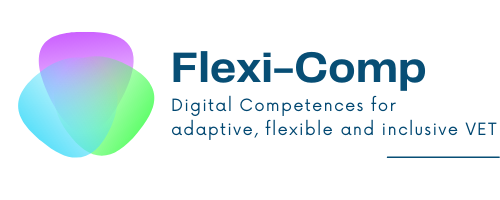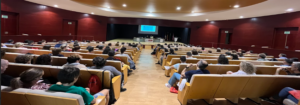
On 2 May 2023, the Spanish Multiplier Event of the Flexicomp project took place in the Assembly Hall of the Campus Viriato de Zamora of the University of Salamanca.
The event was mainly attended by teachers from Secondary Education and VET levels, some of whom participated in the Pilot Training Course and the rest were teachers from other schools interested in the proposal. In addition, two directors of the region’s Continuing Teacher Education Centres and other professionals from the field of educational administration, and developers of educational policies were present. There were 195 interested people registered for the event and, in the end, 159 people attended, all from the field of education and from different locations in Spain.
The session began with the presentation of the project, explaining the objectives and goals achieved. This first presentation was given by Noelia Morales Romo and María José Hernández Serrano, lecturers at the University of Salamanca. After that, some of the preliminary results of the course were presented, comparing the participants’ initial self-assessment of their prior knowledge, with the final self-assessment about the 8 domain competences of the Flexicomp Framework. The competency areas that had increased the most were those related to the design and development of digital learning and those related to collaborative intelligence. The analysis and presentation of the results was carried out by researchers Belén González Larrea and Miguel and Miguel Eiros Bachiller, from the University of Salamanca.
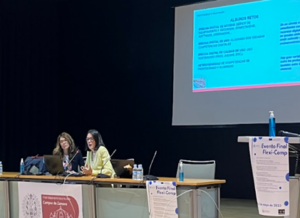
This was followed by two interactive workshops for the attendees, which provided relevant topics for the development of new digital competences. The first of these opened a great debate on the challenges of privacy regulations in the educational world: “Privacy in education: Let’s save the campus”, led by José Eladio González Martínez and Pedro Calbarro Morales, both advisors from the Zamora Centre for Training and Educational Innovation. Using interactive resources and a Scaperoom, participants were able to see the importance of this competence and the importance of preserving the privacy of learners’ information, which is one of the competences included into the Flexi-comp framework.
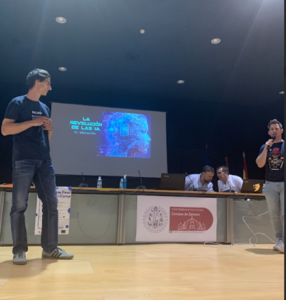
The second workshop addressed one of the current concerns to teachers: “The Artificial Intelligence revolution in education”, led by Gabriel Membibre García and Héctor García Rodríguez, both advisors from the Zamora Centre for Training and Educational Innovation. In this workshop, attendees discovered how AI can be a good tool to support teaching-learning processes, with live demonstrations using ChatGPT. This workshop offered resources to support the development of lessons or simultaneous translation of video subtitles, to other more creative ones, which can be used to create digital productions of music or artistic pieces, very useful to implement in the classroom with different groups of students.
In the second part of the event, some results on the level of satisfaction and usefulness of the course were presented. This section was presented by Zulima Sánchez Sánchez, lecturer from the University of Salamanca, as an open space for evaluation, in order to understand the degree of relevance that each of the 8 areas and 26 competences have in the training of educators and the multiplier impact on their learners, with special attention to the most vulnerable.
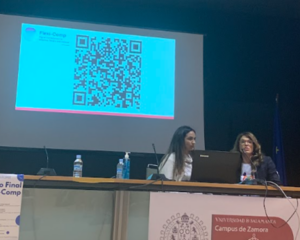
A participatory exchange was established through which attendees accessed (via a QR code) the assessment of the Competency Framework and the Programme. The results showed high levels of agreement on the usefulness of the competences and their ease of implementation to the educational settings.
The event was closed by Francisco José Tejero Alvaredo, Head of the Educational Programmes Area of the Provincial Education Directorate of Zamora. As an expert in educational programmes and policies, he highlighted the importance of this training programme, which has managed to respond to the personalised needs of teachers working with diverse students and in situations of inequality or social vulnerability.
One of the innovative formulas of the course is its flexible and collaborative nature, which allows educators to share resources or open lines of discussion in the face of various critical incidents.
In the Collaborative Corner space Tell your story! participants were offered the opportunity to become co-creators of the course by developing different scenarios, just like those presented in each unit, with problems or situations to be solved through the mastery of the different competences developed,
The video game scenarios developed by the participants were also very diverse and stimulatingly challenging for other teachers to solve, as VET is such a diverse area and associated with different highly changing areas of work.
